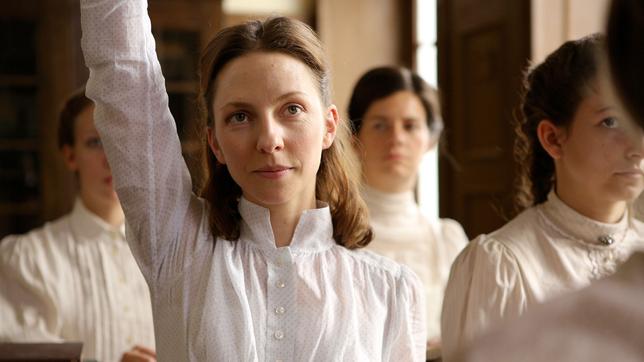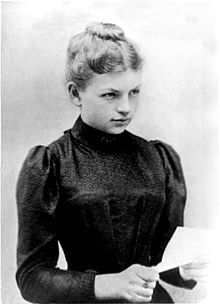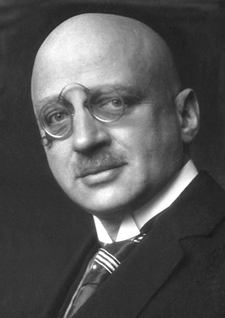
Clara Immerwahr
is the title of a historical and biographical drama which premiered on German
television (ARD) in 2014. Clara Immerwahr (the main character) was a German
scientist and the first woman in Germany to be awarded a doctorate in
chemistry. Here is some basic information about this drama:
** Director:
Harald Sicheritz
** Writers: Susanne Freund and Burt Weinshanker
** Soundtrack: German – no English subtitles!
** Run time: ca 90 minutes
** Writers: Susanne Freund and Burt Weinshanker
** Soundtrack: German – no English subtitles!
** Run time: ca 90 minutes
The cast includes
the following:
** Katharina
Schüttler as Clara Immerwahr (1870-1915) – a scientist - married to Fritz Haber
1901-1915
** Maximilian Brückner as Fritz Haber (1868-1934) – a scientist – his first wife: Clara Immerwahr 1901-1915 – his second wife: Charlotte Nathan 1917-1927
** Wolf Bachofner as Siegfried Haber – Fritz Haber’s father
** August Zirner as Philipp Immerwahr – Clara’s father
** Peter Simonischek as Rector Engler
** Lucas Gregorowicz as Richard Abegg (1869-1910) – a scientist
** Simon Schwarz as Otto Sackur (1880-1914) – a scientist
** Philip Hochmair as David Sachs – a scientist from Austria
** Martina Ebm as Rosa – a maid who works for Clara and Fritz
** Maximilian Brückner as Fritz Haber (1868-1934) – a scientist – his first wife: Clara Immerwahr 1901-1915 – his second wife: Charlotte Nathan 1917-1927
** Wolf Bachofner as Siegfried Haber – Fritz Haber’s father
** August Zirner as Philipp Immerwahr – Clara’s father
** Peter Simonischek as Rector Engler
** Lucas Gregorowicz as Richard Abegg (1869-1910) – a scientist
** Simon Schwarz as Otto Sackur (1880-1914) – a scientist
** Philip Hochmair as David Sachs – a scientist from Austria
** Martina Ebm as Rosa – a maid who works for Clara and Fritz
GERMANY
In 1870 there was
a war between France and Prussia. France was defeated. In 1871 a united Germany
was proclaimed. The proclamation was made in the Hall of Mirrors at the Palace
of Versailles not far from Paris. This location was chosen to humiliate the
French.
Now all German
states (except Austria) were united in one German Empire, dominated by Prussia.
The Prussian King (Wilhelm I) became the German emperor, while the Prussian
Chancellor (Otto von Bismarck) became the German Chancellor.
The new German
state was conservative, authoritarian, and militaristic. A man was supposed to
get an education, find a job and have a career as a civilian or in the
military.
A woman was supposed
to get married and have children. She was supposed to be a homemaker. She was
not supposed to get an education and certainly not supposed to find a job and
have a career.
THE MAIN CHARACTER
Clara Immerwahr
was born in a village not far from Breslau in 1870 (the year when France was
defeated by Prussia). At the time, Breslau was a German town. Today it is
called Wroclaw and it is located in Poland.
Clara’s father was
a farmer, but his hobby was chemistry. When he talked to Clara about his hobby,
she was interested. Clara did not fit the German tradition. She wanted to
learn, she wanted to study.
First, she wanted
to get a high-school diploma (in German: Abitur). This was not easy. Girls were
not supposed to do this. High schools were for boys. A girl needed a special
permission and separate lessons to get a high-school diploma. It was not easy,
but Clara got it.
Next, she wanted
to study chemistry at the university. This was even more difficult. German
universities were only open to men. Women were not allowed to study at a German
university. A woman would need a special permission to be considered and the
professor must give his permission for the woman to attend his classes. It was
not easy, but Clara got it.
In the year 1900,
she was awarded a doctorate in chemistry. She was the first woman in Germany to
get this degree. Once she had her degree, she wanted to find a job and work in
chemistry. This was highly unusual, in fact, this had never happened before. A
woman was not supposed to do something like this. She could not get a real job.
She might be allowed to work as the assistant of a male chemist.
As a young woman, Clara
had met Fritz Haber when he was a student of chemistry. He had proposed to her,
but she had turned him down, because she had just been given permission to
attend classes at the local University of Breslau. She did not want to give up
on this chance just to get married.
In 1901, shortly
after her graduation, Clara and Fritz met again. He proposed again and this
time she said yes. They were married in the same year. In 1902 they had a son
who was named Hermann (probably named after his father’s uncle).
In 1912, Fritz was
offered a new position in Berlin and the family moved to the capital. Clara
wanted to work after her marriage to Fritz and for a while she did, but once
Hermann was born, she did not have time to work. She had to take care of the
home and the family, while Fritz had a career. The life as a homemaker was not
what Clara had dreamed about. She became more and more frustrated. The marriage
was falling apart.
In 1915 Clara
committed suicide in the garden outside the family home. Her son Hermann found
his mother lying dead on the ground.
For many years,
Clara was forgotten by the public. But in the 1970s and the 1980s, she was
re-discovered. She was praised as a pioneer, because she had managed to get an
education in a Germany where education was reserved for men, and because she
was the first women to be awarded a doctorate in chemistry.
She was also
described as a pacifist who had opposed the war in 1914 and as an activist for
women’s rights. Apparently, there is no evidence for these claims.
She managed to get
an academic education and for a while she even worked as a chemist, but she did
not have the energy or the time to work as an activist for women’s rights.
When World War One
broke out in 1914, her husband began to work for the German army. He used his
talents as a chemist to develop poison gas. He was the man behind the first
German attack with poison gas at Ypres on 22 April 1915.
Some modern
writers claim Clara was shocked when she realized that her husband was
developing poison gas. They claim she tried to persuade him to stop this work,
because it was morally wrong. She told him a scientist should work for the benefit
of the people, and not try to kill people.
Apparently, there
is no evidence to support these claims. No evidence shows Clara as a pacifist
who was opposed to her husband’s work for the German army. It seems she was
remembered as the person people think she should have been, and not as the
person she really was.
Why did she kill
herself in 1915? There are at least three suggestions:
# 1. For political
and moral reasons. Because she was a pacifist; because she was against the war
and against the use of poison gas; and because she was unable to stop her
husband’s work.
# 2. For personal
reasons. The marriage with Fritz was breaking down. She was disappointed that
she was no longer allowed to work as a scientist. She was upset that Fritz
wanted her to be a homemaker.
# 3. Because she
suffered from a depression.
If we look at the
evidence, it seems that reason number one is not very likely, while reasons
number two and three seem much more likely.
THE HISTORICAL
DRAMA
The time frame is
1877-1915. The story begins in 1877 when Clara is only 17 years old. From this
point in time, we follow her life, her education and her career until the end
of her life in 1915.
Most of what we
see in the drama is true. But some historical details have been added or
altered. We know she meets Fritz Haber when she is still young. In the drama,
she has a minor accident with her bicycle. Fritz happens to be there and he
helps her. In the real world, they met each other at a dancing school. I do not
know why this detail was altered.
The drama includes
a scientist from Austria, David Sachs, who is interested in Clara. Perhaps she
is also interested in him. One day he invites her to join him for a ride in a
hot air balloon. However, Clara and David are seen together and the news comes
back to Fritz who is upset about it. He thinks she is being unfaithful to him.
After this, Clara has no more contact with David.
I think David Sachs
is a fictional character. I think the episode with the hot air balloon was
added to make the story more interesting and create some additional drama.
Clara has a
mentor, Professor Richard Abegg, who tries to help Clara with her career. He is
not opposed to having a woman in the laboratory. This detail is true. In the
drama, we see him several times.
Richard Abegg had
a hobby: he was fascinated by gas balloons. When he died in 1910, at the age of
41, it was because his balloon crashed. Perhaps this is why the drama includes
an episode with a hot air balloon.
In the drama, we
see how Clara is increasingly frustrated: she cannot work as a scientist,
because she has to take care of the son Hermann.
At first, Fritz is
happy to have a wife who understands his work. But once they are married and
once they have a son, he becomes more and more old school. He wants his wife to
be a homemaker, to take care of the child and the home. He no longer supports
her ambition to work in science. This change of personality is shown in the
drama and I think it is realistic.
Towards the end of
the drama, Clara is against the war. She writes a pacifist pamphlet which
nobody wants to publish, because it will be seen as treason. She tries to
persuade Fritz to stop working for the army and she tries to tell him that
poison gas is horrible. However, there is no evidence to support these details.
How is the suicide
covered in the drama? We see her just before she kills herself. She is writing
a letter to her husband explaining why she must end her own life. Perhaps there
was such a letter. But if there was, it does not exist anymore. In the drama,
Fritz reads the letter and throws it into the fire. The letter burns. Perhaps this
is why it does not exist anymore!
What do reviewers
say about this drama? On IMDb it has a rating of 63 per cent, which corresponds
to 3.2 stars on Amazon. If you ask me, this rating is too harsh. On the other
hand, I cannot go all the way to the top, because there are some flaws here and
there, especially towards the end where Clara is portrayed as a pacifist who is
opposed to the war and her husband’s work for the German army.
I like this drama
and I want to give it a good rating, but I have to remove one star because of
these flaws. Therefore I think it deserves a rating of four stars.
PS # 1. The
following articles are available online:
** Ryan Carty,
“Casualty of War,” Distillations (Science History Institute), 5 July 2012
** Justin Huggler,
“Germans rediscover First World War heroine in new TV drama,” The Telegraph, 29
May 2014
** Bretislav Friedrich and Dieter Hoffmann, "Clara Immerwahr: A Life in the Shadow of Fritz Haber," One Hundred Years of Chemical Warfare, 2017
** Bretislav Friedrich and Dieter Hoffmann, "Clara Immerwahr: A Life in the Shadow of Fritz Haber," One Hundred Years of Chemical Warfare, 2017
PS # 2. The following biography is available in German: Der Fall Clara Immerwahr by Gerit von Leitner (1993).
PS # 3. Fritz
Haber married again in 1917. His second wife was Charlotte Nathan (1889-1976).
They were married 1917-1927. Fritz and Charlotte had two children.
PS # 4. In 1918,
Fritz Haber was awarded the Nobel Prize in chemistry. During the ceremony,
nobody talked about the poison gas he had developed and used during the attack
at Ypres on 22 April 1915.
PS # 5. In 1933,
when Hitler and the Nazi Party came to power, Haber was in trouble. As the
leader of an academic institute, he was told to fire all members of staff who
were Jewish. He did not want to do this.
What about
himself? Haber was a Jew, who had converted to Christianity long ago, as had
his first wife Clara. He could not know if the Nazis would leave him alone or
take him as well.
He decided to
resign and to leave the country. He left Germany in August 1933. He was invited
to England. He accepted the invitation. While he was there, he was invited to
go to Palestine. He accepted the invitation, but he never made it. He died in
Switzerland in 1934. He was buried there. His first wife Clara had been buried
in Berlin in 1915. But in 1937 the remains of Clara were transferred to Basel.
They are buried side by side.
PS # 6. Doctor
Hope is a historical and biographical drama which premiered in 2009. It is
based on the life and career of Hope Bridges Adams-Lehmann (1855-1916), the first female doctor in Germany. Although she obtained her medical diploma
in Germany in 1880, she was not acknowledged as a doctor and not permitted to use the
title until 1904. In some respects, the story of Hope Bridges is similar to the
story of Clara Immerwahr.
*****

Clara Immerwahr (1870-1915)
*****

Fritz Haber (1868-1934)
*****

On the left: a tombstone for Fritz and Clara in a cemetery in Basel, Switzerland. On the right: a memorial for Clara in the garden of the Fritz Haber Institute, established in 2006.
*****
No comments:
Post a Comment